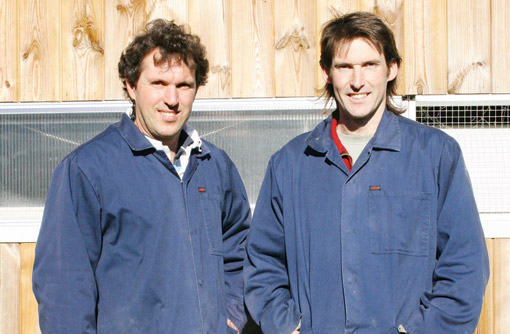Partnership approach boosts free-range chicken sales

Half-brothers Tim Bailey and Charlie Woodford farm in Wiltshire and have been working in partnership with other farms, including Waitrose’s own Leckford Estate, for some time.
Bailey and Woodford is a family-run farm business that champions free range and promotes the benefits of locally-produced chicken. The business consists of two major farm units: Oakley Farm (rearing) and East Clyffe Farm (finishing), supplying extra-large Wiltshire Free Range Chicken, exclusively for Waitrose.
“I have worked in poultry farming since the mid-1980s, but it was in the mid-1990s the business eventually established a significant contract with Waitrose,” says Mr Bailey. “I actually read an article in Poultry World that detailed an open day being held by Waitrose who were looking for commercial farmers to work with. I went along and the rest is history.”
At the beginning all parties were cautious, he recalls, and it took a year or so to agree terms and sign contracts. “The supply chain was initially slow to work, simply because consumers were not willing to accept free range in the way they do now.”
But that has now changed and the half-brothers say they are proud to have been one of the first farms to operate in this way.
The business involves rearing broiler birds both for their own farm and for the Leckford Estate, supplying about two-thirds of all free-range birds for Waitrose.
“We have a maximum capacity of 36,000 birds; however we are currently operating at close to 30,000 with an output of 7,500 birds a week,” says Mr Bailey.
“In order to be successful we have to be well organised and ensure great attention to detail in everything we do. We farm eight-and-a-half crops a year – the chicks come in at day old, are reared to 31 days old and finished to 66 days.
“The birds are from a slow-maturing breed and are reared in a way that encourages their natural instincts and behaviour. We range our birds for 10 additional days compared to standard free range, in order to produce an extra-large, family-sized bird.”
The half brothers work hard developing trusted industry partners, such as Humphrey Feeds which offers on-farm support and produces bespoke diets, and PD Hooks hatchery, which supplies them with their Hubbard chicks.
“In order to make our business a success, we need to ensure continual crop rotation,” says Mr Woodford. “This involves working with industry suppliers to ensure deliveries are on time and at the required standard. We simply can’t afford to stand still or have a break in production.
“We are busy rearing the next crop, while the previous flock is being finished. Combined with stringent biosecurity measures this allows for a maximum output from our farm. Each individual shed will then have a 10-day break before the next crop arrives to reinforce the biosecurity.”
Free range preferred
“Bird welfare is an incredibly important part of what we do,” he continues. “Free range has always has been our preferred farming system. It is more open to the elements, with the weather and seasonality playing a greater role, and many additional challenges to overcome.
“We work closely with Humphrey Feeds to ensure our birds are provided with the optimum nutrition to nurture the birds’ growth and development, while adhering to high welfare standards. Diet is crucial in providing the chicken with colour, flavour and high meat eating quality.”
The half brothers strive for a high level of consistency in all facets of the business and continually look at ways to improve output or further reduce stress on the birds.
“We are very aware of the delicate balance required to ensure optimum productivity while maintaining a high degree of bird welfare,” Mr Woodford continues.
“We keep the rearing sheds heated at 30C for the first three days and then gradually lower the temperature in preparation for the crop being moved to the free-range finishing units. We have low on-farm stocking densities, operating at 21kg/sq m, well beneath the maximum 27.5kg/sq m allowed by EU legislation.
“We have recently installed meshed ramps by the pop holes on the finishing sheds to help keep the house clean and allow easier access for the birds. We keep sheep on the perimeter of the range and ensure a good covering of grass. And we are in the process of planting apple trees to offer the birds shelter, but also to bring back various varieties of apple that are not readily available due to the dwindling number of orchards in the UK.”
Mr Bailey explains that birds are always moved between farms at night using a specialist catching team. “The birds are more docile at night, arrive early the next morning and have instant access to food and water. As a result they are less stressed and therefore lose less bodyweight during transportation.”
Finished crops are depopulated in two stages, with larger birds, usually the cockerels, going first, followed a few days later by the lighter hens. “Our target bodyweight for the bird at 66 days is 3.2kg. The product is an extra-large family bird, ideal for roasting and capable of lasting a family of four for a number of meals. The birds we farm are the biggest free-range chickens sold in the UK.”
